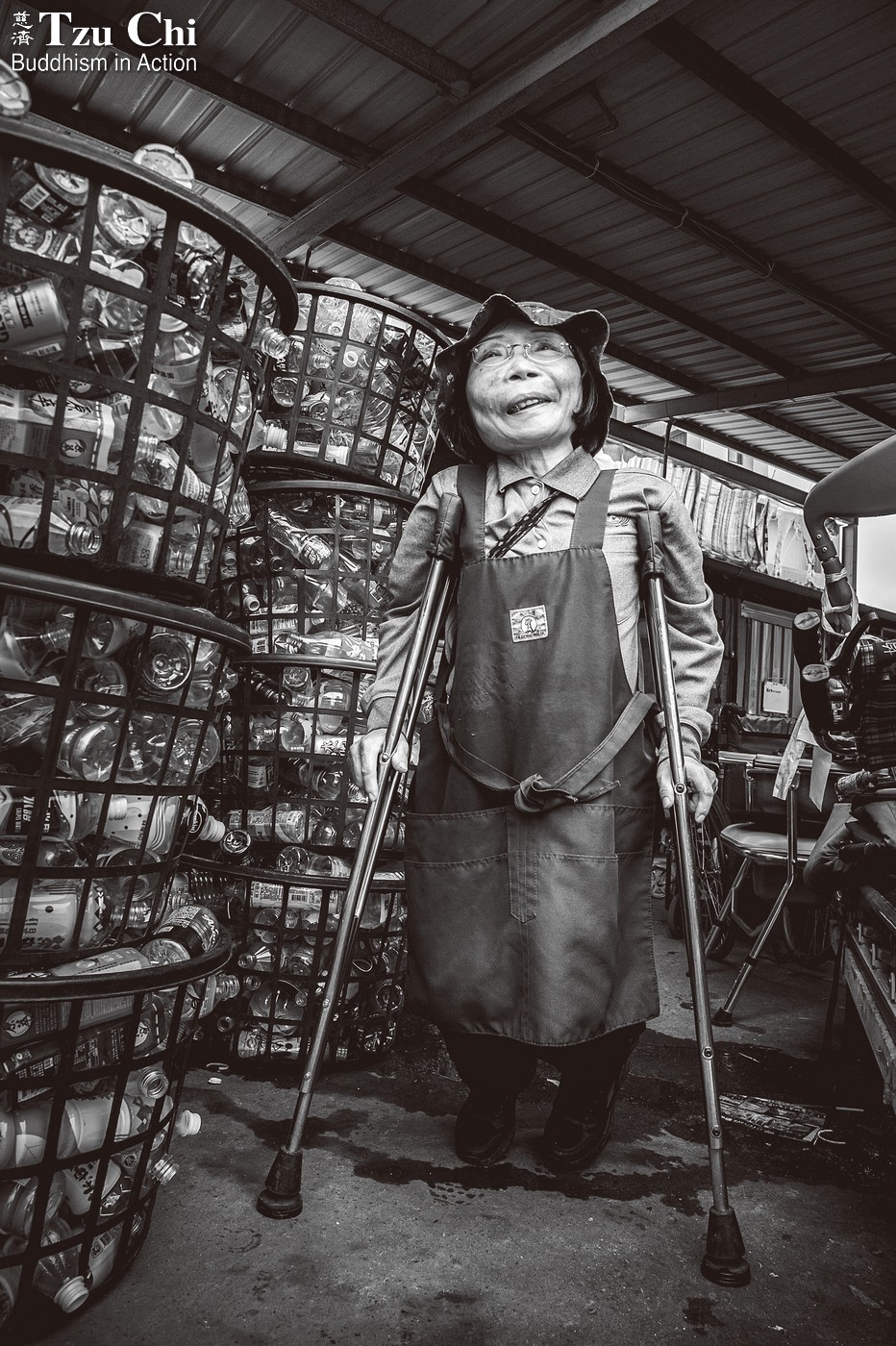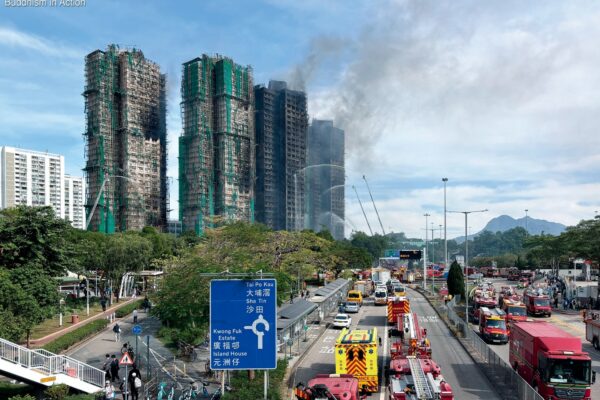By Huang Xiao-zhe and Cai Yu-xuan
Translated by Wu Hsiao-ting
Photos by Huang Xiao-zhe

She was hard not to notice. Standing up, her height was a mere 1.3 meters (4’3”). She relied on two crutches to slowly move forward, and her face and hands showed multiple deformities and contortions. However, she appeared completely unconcerned about her appearance or movements as she worked with undivided attention at the Tzu Chi Chang’an Recycling Station in Taichung, central Taiwan.
Her name is Wu Zhen-ye (吳貞葉). She suffers from a congenital condition called osteogenesis imperfecta, also known as “brittle bone disease.” She wasn’t always like this. In fact, she vividly recalls a time from her childhood when she was a healthy and energetic nine-year-old, with all her limbs functioning perfectly. In those days, she would play joyfully in the field. One day, however, she fell and fractured her left thigh bone. Seeking medical assistance, she was taken to a martial arts center so the broken bone could be set. To everyone’s surprise, after a month, it was discovered that the bone had not healed properly. As a result, she had to undergo another painful procedure at the martial arts center: the same bone had to be forcibly broken and reset. This traumatic experience remains deeply etched in her memory.
We were astonished as we listened to her story. We found it hard to believe that such bizarre treatment had been inflicted on a child. During our conversation with her, we discovered that while her genes may have carried a congenital defect, they also endowed her with an extraordinary quality of being optimistic and cheerful. She exudes confidence and warmth in her interactions with others, always wearing a smile. Although her bones are as fragile as glass, her heart is like glass too: transparent and pure, reflecting a resilient light.
Willing to bear, happy to contribute
Wu Zhen-ye approaches recycling in the same way as most other Tzu Chi recycling volunteers. With a deep care for the Earth, she wholeheartedly dedicates herself to contributing to a more sustainable world. When she was younger, she would ride her three-wheeled motor scooter to nearby shops, collecting recyclables and making every effort to fill the vehicle to its capacity. As her physical strength declined with age, she eventually transitioned to resource sorting at a recycling station.
While some may perceive a recycling station as a potentially hazardous environment for someone with brittle bone disease, demanding constant caution to avoid injury, Wu sees it differently. A recycling station in her eyes is a treasure trove that allows her to forget about her own limitations and dedicate herself to serving. At times, you can see her sorting different types of plastic bags, and other times, removing rings from the necks of PET bottles. She also takes on the task of cleaning and organizing the environment.
Wu firmly believes in the law of karma, that our actions in past lives determine our present circumstances and that our current actions will shape our future lives. This belief empowers her to rise above the trials and challenges posed by her physical condition. Guided by her unwavering faith, she willingly accepts whatever life presents to her and does her best to give.
Her loving mother
Wu volunteers at the Chang’an Recycling Station twice a week. Whenever possible, she takes her 84-year-old mother along too. Despite her small stature and physical limitations, Wu rides her three-wheeled motor scooter to pick up her mother and drive her home afterward. Even though it may require some extra time and effort to assist her mother in getting on and off the vehicle, she does it patiently and happily. Throughout the journey, she remains cautious and careful to ensure their safety.
Due to her condition, Wu experienced innumerable days seeking medical treatment or resting at home during her school days. Although her mother only completed elementary school, she used newspapers and television to teach Wu literacy. She even personally guided her in writing and reviewing lessons to make up for the missed learning opportunities. Wu said gratefully, “My mother has never given up on me; she is the best teacher in my life!” Instead of complaining about her flawed physique, Wu cherishes the body bestowed upon her by her parents and maximizes its potential by contributing to the betterment of society. The mother provides loving care and companionship, and the daughter reciprocates by caring for her mother and performing acts of kindness. The intimate interaction between mother and daughter not only shows the flow and circulation of love but also a heartwarming touch of wisdom.
A normal life
At home, Wu’s daily life is not much different from that of an average person. Instead of using her crutches at home, she sits on a rolling stool, effortlessly gliding it with a gentle push from her hand or foot. Tasks like cleaning the floor, wiping furniture, doing laundry, and cooking do not pose a challenge for her. In her younger years, she acquired sewing skills at a vocational training center and worked as a seamstress in another city for several years. After getting married, she continued to alter clothes for others, supplementing her household income.
Entering her sewing space, one can see a frame displaying a sweet wedding photo hanging on the wall. Behind that blissful image lies another story of hardships and setbacks for her. At the age of 27, just as she had met her future husband, she was diagnosed with breast cancer, dealing her yet another cruel blow. Fortunately, she triumphed over the illness after undergoing treatment. Wu and her husband eventually exchanged vows and welcomed a daughter into the world when she was 29. She is profoundly grateful for having encountered a husband who never looked down on her. He has stood by her side, offering support and care from their pre-marriage days to their married life. Together, they have built a family and lead a life no different from that of an average couple. This, to her, is the ultimate satisfaction.
Resilience
“This is me when I was young, before any deformities started,” Wu said, pointing at herself in a group photo taken during her childhood. “I used to play fearlessly, without any worries.”
At the age of 57, she has endured numerous deformities and fractures in her head and limbs, along with the growth of tumors. But these challenging trials and painful experiences have not defeated her. Instead, her complete acceptance of life’s challenges, her optimism, courage, and kindness have transformed her into an exemplary bodhisattva, guiding others along their own paths.
Wu once provided support for a person who was feeling hopeless. Little did she expect that after a few hours of conversation, she exerted enough force lifting herself up that she accidentally fractured a bone. As the saying goes, “A broken arm three times makes a good doctor.” Drawing from her extensive experiences of injury, Wu immediately used her jacket as an impromptu sling to stabilize her arm. On another occasion, she met with a woman who was unable to overcome the grief of losing a child. Upon seeing what Wu looked like, the woman burst into tears and couldn’t stop crying. Witnessing how Wu had courageously confronted life’s challenges, the woman was inspired to gather her strength and find the resilience to carry on.
Wu’s personal story has had a profound impact on many individuals, including her own family. Motivated by her example, her daughter has taken the initiative to help at the recycling station, continuing the lineage of goodness. Wu feels that her life journey, though arduous, is deeply rewarding. It is impossible not to admire and applaud her, as she truly embodies the indomitable spirit that shines brightly amidst life’s adversities.



